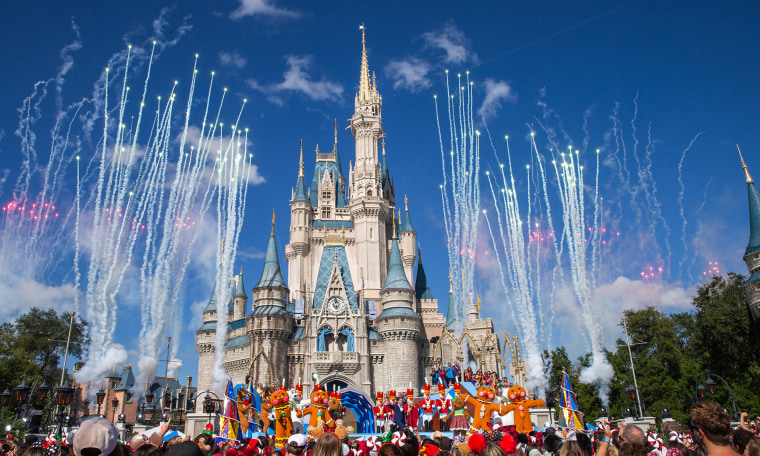A group of Walt Disney Co. employees has announced plans for a series of walkouts Tuesday to express its outrage at the company’s reluctance to condemn Florida’s “Don’t Say Gay” bill. That bill, officially known as the Parental Rights in Education bill, had passed both chambers of the Florida Legislature and been sent to Gov. Ron DeSantis for his signature before Disney CEO Bob Chapek said Disney, a major Florida employer and tourist draw, was opposed to it.
Disney should have been out front in opposing a bill that would prohibit discussion about LGBTQ people.
Disney, which famously doesn’t tolerate any discrimination at its theme parks, should have been out front in opposing a bill that would prohibit discussion about LGBTQ people in Florida schools, and Chapek acknowledged that the company had failed at that when he told shareholders at a meeting March 11, "I know that many are upset that we did not speak out against the bill.” But he wasn’t convincing when he said, “We were opposed to the bill from the outset, but we chose not to take a public position on it because we thought we could be more effective working behind the scenes, engaging directly with lawmakers on both sides of the aisle."
In a letter to employees that was published on Disney’s website, Chapek said: “It is clear that this is not just an issue about a bill in Florida, but instead yet another challenge to basic human rights. You needed me to be a stronger ally in the fight for equal rights and I let you down. I am sorry." He said the company will pause all political donations in Florida.
The group planning Tuesday’s walkouts says on its website that a “temporary pause is not enough — we require a commitment,” and it demands that Disney “immediately and indefinitely cease all campaign donations” to those responsible for helping create or pass the bill. The group also demands that Disney “publicly commit to an actionable plan that protects employees from hateful legislation,” including not moving any employees to Florida or firing any employees who refuse assignments there.
This isn’t the first time a major company has found itself in the crosshairs of LGBTQ employees. Some Netflix employees walked out last year in protest of Dave Chappelle’s special that attacked trans people. We should take note of the fact that, for the most part, employees at these two companies haven’t quit. Instead, they have been asking their employers to listen and to make meaningful change.
One thing is increasingly clear: Companies are no longer allowed to sit on any sideline on any social issue. It’s not surprising now to see an Uber or an Amazon roll out huge Black Lives Matter initiatives — it was even less surprising after Minneapolis police murdered George Floyd — or for companies such as Citigroup and Lyft to wade into the fight over access to abortions.
“Forty-four percent of the S&P 500’s large, public corporations supported the liberal side of LGBT rights, immigration or racial justice between 2008 and 2017,” Beth Daley recently found in her own research at The Conversation, highlighting that when companies do speak up, it is for liberal issues.
“No S&P 500 companies took conservative stances on these issues,” she continued, which is a win — and probably not too surprising when the only major conservative stance we’ve seen continue is Chick-fil-A’s continued support of being anti-LGBTQ (even while it sometimes says it isn’t). America is more diverse than ever, so the need for brands to engage with that diversifying audience makes sense.
But what we need from these companies is consistency and not just empty marketing promises. Like those at so many other companies, Disney executives have had a practice of giving campaign money to politicians on both sides of the aisle, a practice that now has them facing a backlash.
Disney should want to become the poster child of what corporate responsibility will look like. The company has long had to walk the tightrope of creating more progressive content and keeping its audiences happy. In 2009, Disney made Tiana its first Black princess in “The Princess and the Frog.” Next month, “Better Nate Than Ever,” openly gay director Tim Federle's autobiographical film, will be released on Disney+, and it’s so radically queer that even I was surprised. Watching an advance screener made me realize that the House of Mouse is slowly changing for the better.
Disney should want to become the poster child of what corporate responsibility will look like.
But Disney can’t count on praise from communities it previously erased even as it gives money to Republicans in Florida who came up with “Don’t Say Gay.” Such duplicity we can’t ignore.
Companies that say they’re against oppression will not only have to lean in, but they will also have to be consistent. And it won’t be just the public demanding that they do right; it will also be their own employees.
Capitalism isn’t really built to save us, as poet Audre Lorde argued when she said, “The master’s tools will never dismantle the master’s house,” but it can work more for us while we are under its tremendous weight. Because what we are seeing more and more these days is that workers and consumers are refusing to let their own money contribute to their own oppression — and that is a labor fight worth supporting.
